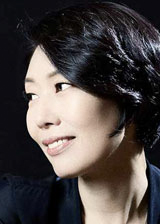
Zoe Kolenovsky
Staff writer
In her first visit to Chautauqua, pianist HaeSun Paik said she’s excited to experience all the artistic and cultural wonders the Institution and the School of Music have to offer.
“It’s a huge program,” said Paik. “I’m just very excited and very curious about … the whole community, all the arts, everything.”
Paik is at Chautauqua this week as the Piano Program’s final guest faculty member for the season, joining resident instructors Nikki Melville and J.Y. Song to teach private lessons and deliver a masterclass Wednesday afternoon. She is set to kick off her visit with a recital at 4 p.m. today in Elizabeth S. Lenna Hall, performing works from a diverse array of composers.
“One does have to really balance,” said Paik of the difficulties managing responsibilities as both a teacher and performer. “I feel that you teach better when you perform, … so it goes together if you balance it well.”
Renowned for her emotive performances, Paik has played in concert across North America, Europe and Asia as a soloist, in chamber, and with such orchestras as the London Orchestra, the Tokyo Philharmonic Orchestra and the Russian National Orchestra.
She came to the United States from Korea at age 14 to pursue her musical studies, receiving a bachelor’s degree, then master’s degree, of music from the New England Conservatory. After receiving Third Prize in the Tchaikovsky International Piano Competition in 1994 — the first Korean to place in the top three — she became a rising star in the piano world and was the recipient of the Young Artist Award of Korea from the Korean government in 1995.
In addition to her performing accolades, she was the youngest pianist of her generation to be appointed a music professor at Seoul National University and has since taught at the Cleveland Institute of Music, the Catholic University of Daegu and the New England Conservatory, where she is currently a faculty member.
Paik is looking forward to meeting the students of the School of Music and being able to work with a new crop of young talent.
“It’s always a challenge and also exciting because you meet someone that you don’t know anything about their background … (and you’re) figuring out what their needs are,” she said. “This younger generation, they get everything and they have a tremendous repertoire. Their learning time is so quick, and they just absorb so much, so actually through them I learn a lot.”
It is Paik’s first time visiting Chautauqua, and she is excited to begin her stay by presenting the community with some of her favorite classical pieces in this afternoon’s recital.
The program begins with Snapshots, by Florence Price, a composer Paik said she wanted to highlight because Price, who is too often overlooked, represents an incredible story of overcoming adversity.
Price was born in 1887 in Little Rock, Arkansas, but lived the majority of her life in Chicago. During her studies, Price was forced to lie about her identity due to racial discrimination, pretending she was Mexican instead of part African American in order to be allowed to attend university. Paik said she relates to this aspect of Price’s history as an immigrant student herself who faced a significant cultural barrier.
“Of course, being Asian, now we are the majority of all classical music,” she said. “But when I first came to this country, I was a teenager (experiencing) a language barrier, and also extremely sensitive.”
She said Price share an alma mater in the New England Conservatory.
“I really thought that it’s my duty to tell her story, because I come from the same school,” Paik said. “She wrote a very daring kind of repertoire and I just wanted to share that.”
Paik describes Price’s music as emblematic of American Impressionism.
“She has the influence of many different backgrounds,” Paik said. “You hear hints of Debussy in her, with a lot of religious background, so kind of blues and spiritual music. And then her music is also very colorful, poetic … and it’s actually very technically demanding.”
Paik will follow this with Beethoven’s 15 Variations and Fugue in E Flat Major, Op. 35, also referred to as the “Eroica Variations” — a piece she said is “very exciting and very contrasting” to Price.
“Most people who know classical music know the theme because of Beethoven,” Paik said. “… It’s extremely challenging for a pianist, although it’s very short variations. One cannot relax until you finish the last note because … once you are lost, you are lost forever.”
The second half of the program will begin with Claude Debussy’s “Images, Book 2,” a choice Paik said was made so the audience would be able to contrast the French Impressionist style with Price’s American Impressionism. The three-movement work has titles very similar to Price’s “Lake Mirror,” “Moon Behind a Cloud,” and “Flame,” from Snapshots — Debussy’s, translated into English, are “Bells through the leaves,” “And the moon descends on the deserted temple” and “Goldfish.”
The recital will conclude with Hungarian composer Franz Liszt’s Venezia e Napoli, a bright, melodic work in three movements.
“In the summertime, what can be a better piece than thinking of Venice and Naples?” Paik said.




